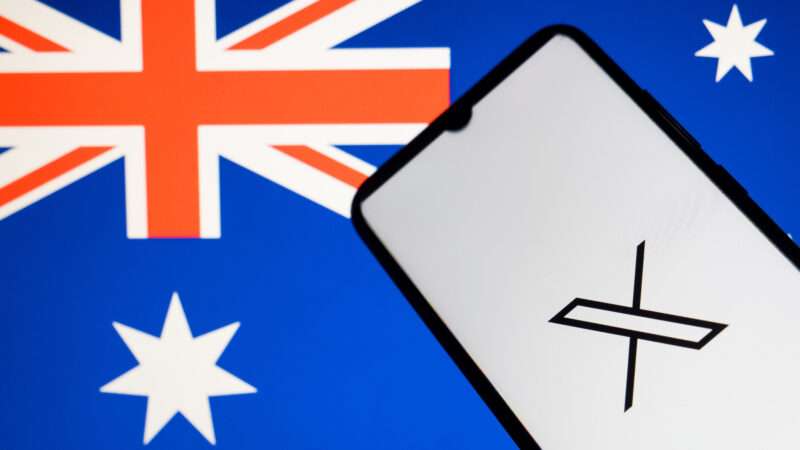
You have to respect anybody willing to tell powerful government officials to get stuffed, and tech titan Elon Musk is pretty good at doing exactly that. While sometimes thin-skinned himself and not always consistent in his free speech principles, the head of social media platform X (formerly Twitter) is the best of the bunch among his peers when it comes to facing down censors. His latest battle is with Australian officials who want to restrict the entire world's access to recordings of a crime.
The dispute involves video of the stabbing of Bishop Mar Mari Emmanuel at Good Shepherd Church in Wakely (warning: graphic images).
A Takedown Order With Global Reach
"The Federal Court today granted a further interim injunction requiring X Corp to immediately hide Class 1 material on X that was subject to eSafety's removal notice of 16 April, 2024," the office of Australia's eSafety Commissioner announced April 24. "In summary, eSafety's removal notice to X Corp required it to take all reasonable steps to ensure the removal of the extreme violent video material of the alleged terrorist act at Wakeley in Sydney on 15 April."
The order, threatening daily fines of $782,500 ($510,178 U.S.) for non-compliance, isn't limited to the country.
"An Australian judge on Monday ruled that social media platform X must block every user in the world from accessing video of a bishop being stabbed in a Sydney church, extending the prohibition beyond users in Australia," noted the AP.
"Our concern is that if ANY country is allowed to censor content for ALL countries, which is what the Australian 'eSafety Commissar' is demanding, then what is to stop any country from controlling the entire Internet?" responded X owner Elon Musk. "We have already censored the content in question for Australia, pending legal appeal, and it is stored only on servers in the USA."
Anger at Musk for refusing to let the Australian government censor the planet has unified much of the country's political class. Prime Minister Anthony Albanese, of the Australian Labor Party, denounced him as an "arrogant billionaire." Senator Sarah Hanson-Young, from the Greens, called him a "narcissistic cowboy." Liberal lawmaker Simon Birmingham said Musk's censorship accusations are "insulting and offensive." Independent Senator Jacqui Lambie raised the hysterical reaction meter to 11 by insisting "someone like that should be in jail and the key be thrown away."
"It takes a special kind of person to attract universal criticism across Australia's federal political landscape," snarked Brett Worthington from the Australian Broadcasting Corporation. He added that the battle between Musk and Australian politicians is really about power and "it is the law of the land, not his commercial interest, that determines what is legal and what isn't."
The Race To Be World Censor
But that's just it: the law of which land? Despite disagreeing with the eSafety takedown order, X's Global Government Affairs team emphasizes that the company "complied with the directive pending a legal challenge." Follow-up orders are about controlling what can be seen by people in the U.S., the U.K., Nigeria, Thailand, and every place on the globe outside Australia's borders. If Canberra can impose its rules across the world on any online platform that happens to do business in Australia, why can't China, or Russia, or Saudi Arabia do the same? The result would be a standard for global speech set by the most restrictive jurisdiction.
There's already precedent for businesses defaulting to tight regulations set by the European Union rather than abide by different rules in different places with the resulting complexity and cost.
"The Brussels Effect refers to the EU's unilateral power to regulate global markets," wrote Columbia Law School's Anu Bradford, author of The Brussels Effect: How the European Union Rules the World (2019). "The EU does not need to impose its standards coercively on anyone—market forces alone are often sufficient to convert the EU standard into the global standard as multinational companies voluntarily extend the EU rule to govern their global operations."
Aggressive enforcement of the European Union's Digital Services Act (DSA) against international media companies has "sparked accusations of overreach and violation of international human rights standards," Jacob Mchangama, CEO of The Future of Free Speech, warned in December. Amidst a "clear trend against freedom of expression in the world's democracies…many democracies see the DSA as a global blueprint for online regulation," he added.
Australia wants the pervasive global regulatory clout wielded by the European Union for itself. If successful, the same reach would be available to every government everywhere, including those even more authoritarian than the notoriously illiberal democracy.
A Bigger Agenda Than One Crime Video
Australia's censorious officials, it should be noted, may be exploiting the conflict for with X for domestic ends. They appear to be weaponizing the spat to promote legislation restricting "misinformation."
"Blaming Musk for refusing to take down vision of the attack – which Albanese mischievously suggested was 'misinformation,' as if it never happened – was absolutely in keeping with the vibe politics that has come to characterise this government," commented James Morrow at The Daily Telegraph.
"The federal government is blatantly misleading the public in linking the terrible attacks in Sydney to its proposed misinformation laws, which are designed to do nothing more than censor the opinion of mainstream Australians online," charges John Storey of the free-market Institute of Public Affairs.
For her part, the country's eSafety Commissioner, Julie Inman Grant, was an executive at X when it was known as Twitter in pre-Musk days and clearly disagrees with the platform's shift in a less-controlling direction. In 2022 she called for a "recalibration of a whole range of human rights that are playing out online, from freedom of speech to the freedom to be free from online violence."
The battle over graphic video images of a terrorist attack likely has less to do with that specific content than it does with official hostility to uncontrolled speech at home and abroad. That's unfortunate for Australians, who already suffer fewer protections for their rights than do the citizens of many other countries, especially the U.S. But it's also bad news for the citizens of other countries if Australia's grasping politicians get their way and make local censorship a global problem.
The post Australia Tries To Censor the World appeared first on Reason.com.
 Psst! Do you accept cookies?
Psst! Do you accept cookies?
What's your thoughts?
Please Register or Login to your account to be able to submit your comment.